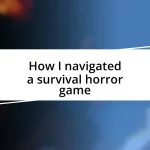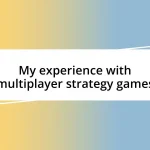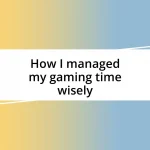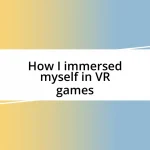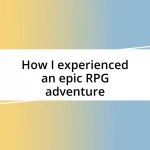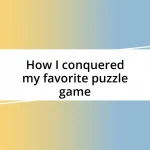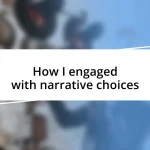Key takeaways:
- Understanding game mechanics and timing decisions can greatly influence winning strategies in Splendor.
- Analyzing opponents’ strategies and adapting your approach is crucial for effective gameplay and countering their moves.
- Reflecting on performance after each game helps identify strengths and weaknesses, turning losses into learning opportunities.
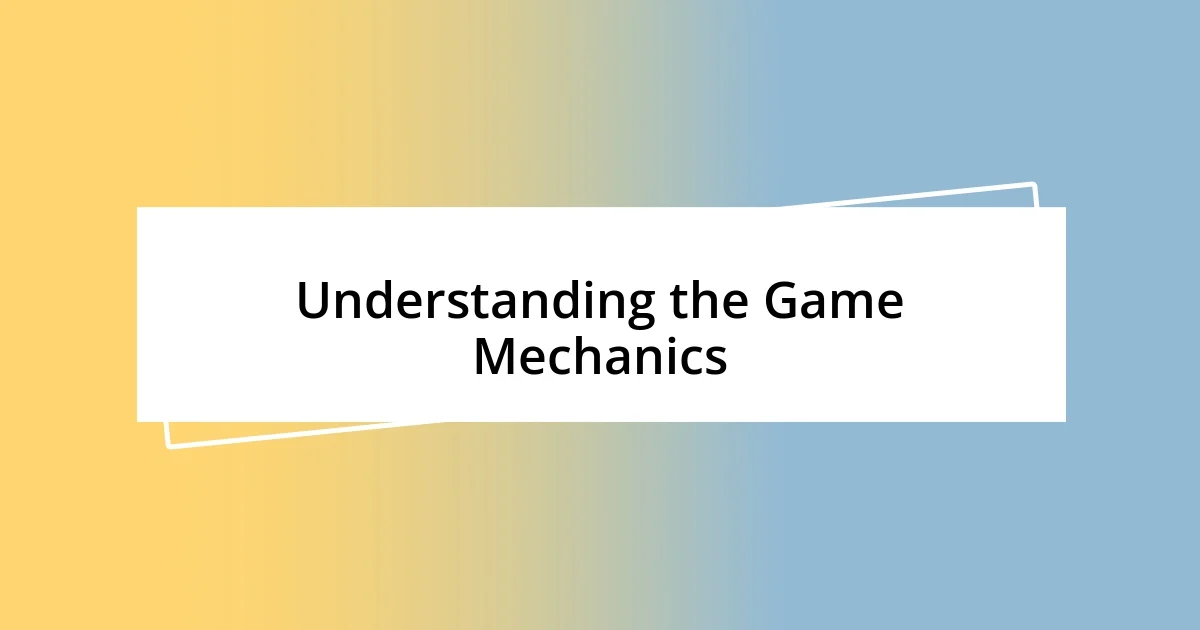
Understanding the Game Mechanics
Understanding the game mechanics in Splendor is essential to elevating your strategy. For instance, managing the balance of resource gems and the nobles you attract can be the difference between winning and losing. I still remember my first few games when I overlooked the nobles—what a mistake! I was so focused on collecting cards that I missed out on valuable bonuses.
The action of acquiring cards might seem straightforward, but the implications of each choice are quite intricate. Every decision impacts future moves, which is why I often pause to consider—how will this card benefit me later? I’ve learned that sometimes holding back for a turn or two can open up a more powerful option on subsequent turns, leading to a game-altering play.
I’ve also discovered that understanding the flow of the game—when to invest heavily in cards versus when to save for high-value ones—adds another layer of depth to my approach. It’s a bit like dancing; timing your moves to match the rhythm of the game allows you to navigate to victory more smoothly. Have you ever felt that rhythm click? When it does, it’s incredibly rewarding.
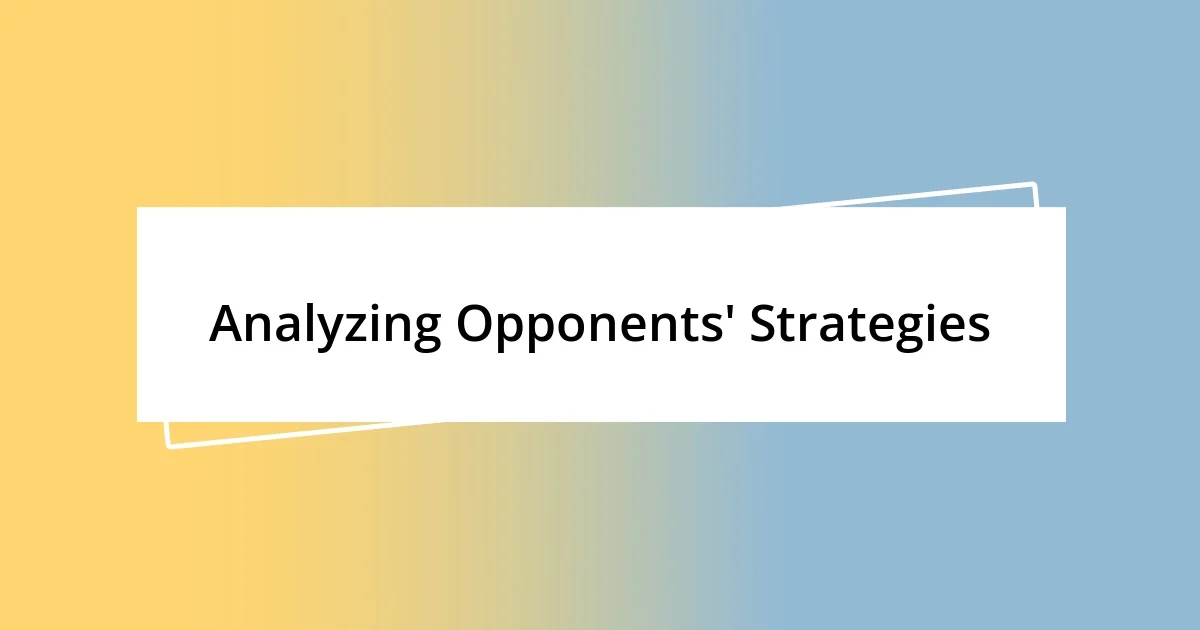
Analyzing Opponents’ Strategies
When it comes to analyzing my opponents’ strategies, I can’t help but feel a sense of excitement. It’s like piecing together a puzzle that reveals how they think, which can significantly influence my own decisions. I often find myself watching their gem collection and card plays intently, evaluating what they’re banking on. For instance, I recall a game where one opponent consistently hoarded a specific gem color, which alerted me that they had their sights set on a high-value card. That intimate knowledge allowed me to pivot my own strategy, countering their plans effectively.
To deepen my analysis, I focus on several key aspects:
- Gem Preferences: Observing which gems my opponents prioritize reveals their strategic focus.
- Noble Goals: Noticing which nobles they are trying to attract helps gauge their end-game plans.
- Card Acquisition Patterns: I pay attention to how often they buy cards and their choices—do they go for low-cost cards or save for the big ones?
- Turns Taken: Analyzing the pace at which they play can offer insight into their confidence and urgency.
- Comments and Reactions: Sometimes, their verbal cues or body language during the game can be telling, revealing their level of interest in certain moves.
By considering these elements, I’ve sharpened my ability to predict opponents’ moves and adjust my strategy accordingly, making every game a thrilling mental challenge.
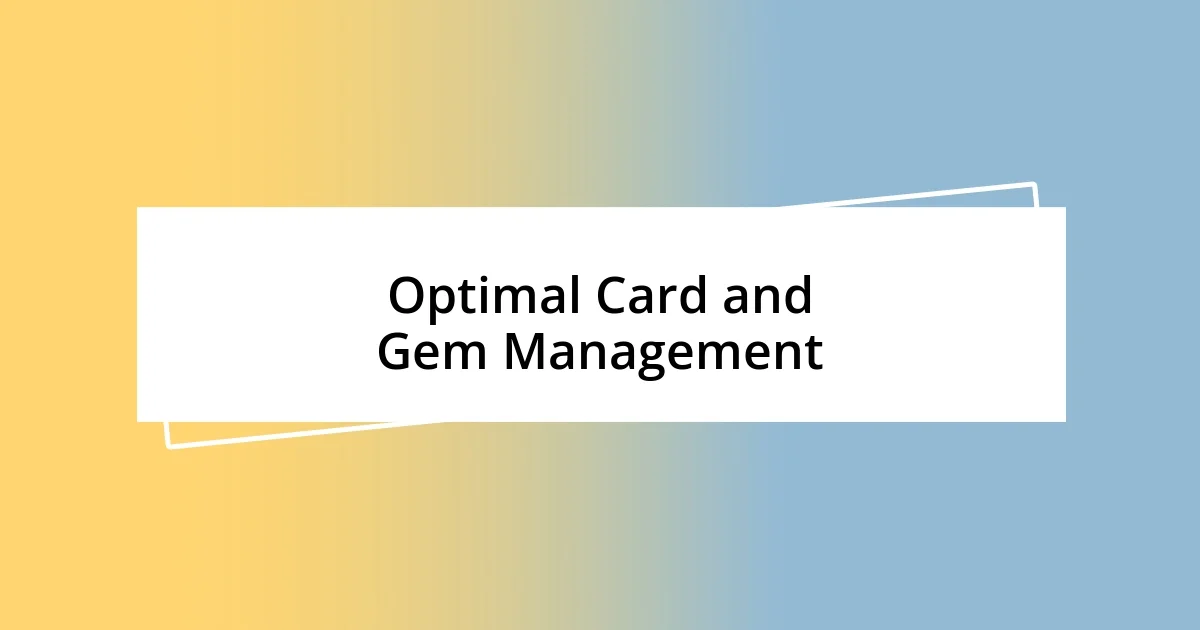
Optimal Card and Gem Management
Optimal Card and Gem Management is a delicate art in Splendor, and I’ve often found that mastering it can set the stage for triumph. I personally prioritize acquiring cards that not only boost my gem collection but also position me to attract nobles later. In one game, I secured a card that seemed modest at first, but it turned out to be a linchpin for unlocking a powerful noble bonus a few turns later. It’s those subtle decisions that keep the game dynamic and engaging.
I’ll say that managing gems effectively can feel like juggling—often, it gets a bit chaotic, but once you find your flow, it can be exhilarating. I’ve come to realize the importance of diversification; hoarding a single gem color might seem tempting, yet being flexible allows for more options down the road. There was that one time when I pursued a strategy focused entirely on securing a specific gem, only to watch my opponents claim the high-value cards I had my eyes on. Adapting to shifting game conditions is vital; it’s about having a keen sense of when to hold gems for a goal and when to spend freely for immediate gains.
I’ve also noticed that keeping a balance between card acquisition and gem collection can significantly enhance your game. For instance, I’ve learned that collecting low-cost cards early can provide a steady gem income, which can later be leveraged to grab those coveted high-value cards. There are moments when I risk giving my opponents a chance to grab cards I need, but oftentimes, those risks pay off with a more robust position later. Skillful card management ensures a thriving game and builds an engaging narrative that keeps everyone on their toes.
| Action | Strategic Importance |
|---|---|
| Acquiring Low-Cost Cards | Establish a gem income quickly |
| Noble Collection | Provides bonus points for winning |
| Diverse Gem Management | Flexibility for opportunities during play |
| Balanced Strategy | Mitigates risk of being low on resources |

Efficient Resource Allocation Techniques
Efficient resource allocation is at the heart of any successful game strategy in Splendor. I’ve learned that planning my moves with foresight can dramatically change the trajectory of my games. For example, I once found myself in a position where I was either going to lose a turn or overcommit to a single gem type. By quickly assessing my options, I chose to spread my investments, which allowed me not only to maintain flexibility but also to block my opponent’s path to a high-value card. It’s incredible how a small decision can pivot the entire game.
In my journey, I’ve realized the importance of prioritization, especially when it comes to gem collection. I tend to focus on gems that are in short supply based on the cards my opponents are eyeing. I still remember that intense game where I noticed my opponent was low on blue gems. By stockpiling them, I was able to control the board, manipulating my opponent’s choices while setting myself up for a powerful card purchase. It’s about knowing when to be assertive and when to take a step back while keeping a watchful eye on both my and my opponents’ resources.
Another technique that has served me well is conducting a mid-game inventory of both my cards and gems. It’s almost like taking a deep breath and assessing the battlefield before diving back in. I frequently ask myself, “Do I have enough resources to make a significant impact in the next few turns?” There was a game where I misjudged my gem distribution and almost got cornered. I swiftly recalibrated my focus on crafting a solid strategy for card draws. By ensuring that I’m not just in the race but actively managing my resources, I find that I can navigate toward a path of victory with more ease.
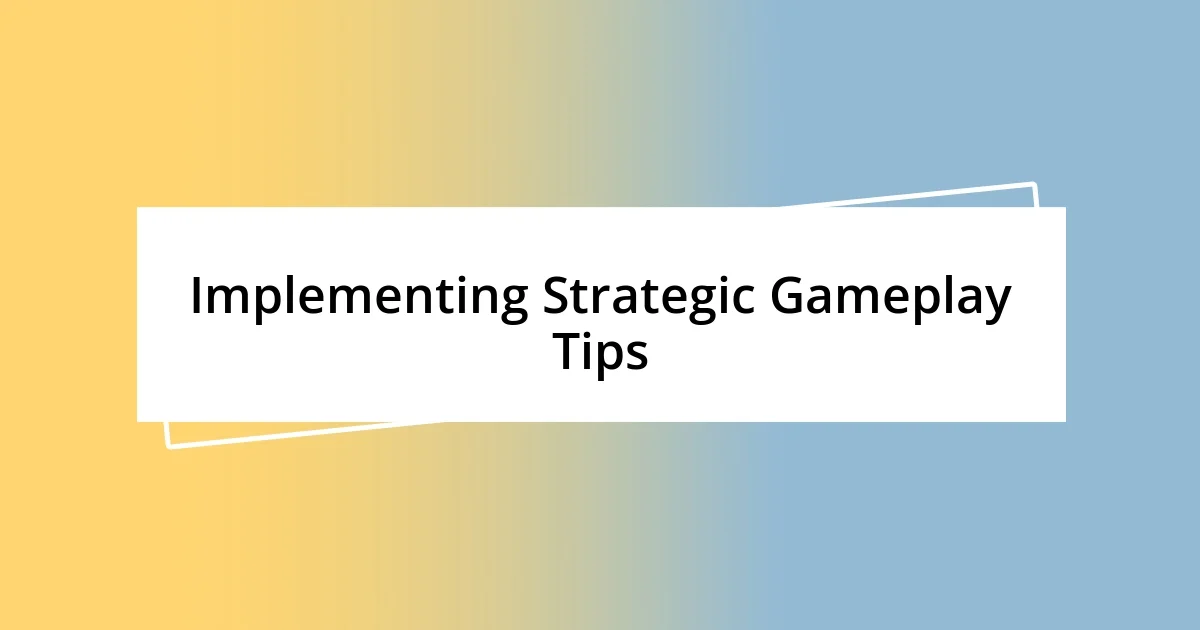
Implementing Strategic Gameplay Tips
Implementing strategic gameplay tips in Splendor can truly elevate your experience. One tip I live by is the art of timing my purchases. I remember one instance when I hesitated to buy a crucial card, letting my opponent snatch it first. The frustration was palpable; had I acted decisively, that card would have streamlined my game and potentially secured a noble. Timing, as I’ve realized, is everything in this game—seizing opportunities as they arise often outweighs the fear of making the wrong choice.
I also find myself reflecting on the importance of observing other players’ strategies. Engaging in games where you notice opponents’ tendencies can shift your approach dramatically. I had a game where I was so focused on acquiring my own gems that I overlooked the fact my rival was building a hefty lead. This became a wake-up call for me. A simple observation turned into a vital adjustment in my quest to stop them from amassing high-value cards. Incorporating this awareness can mean the difference between victory and feeling like you’re left in the dust.
Lastly, I think about the impact of having a backup plan during play. I once went all-in on a strategy centered around a specific noble, only to find I had been outmaneuvered. Reflecting on that experience, I learned to diversify my path to victory. Now, I ask myself, “What’s my fallback if these gems or cards slip away?” This mindset shift has transformed my gameplay, allowing me to remain balanced and ready for anything my opponents throw at me, ensuring I’m not just reactive but proactive as well.
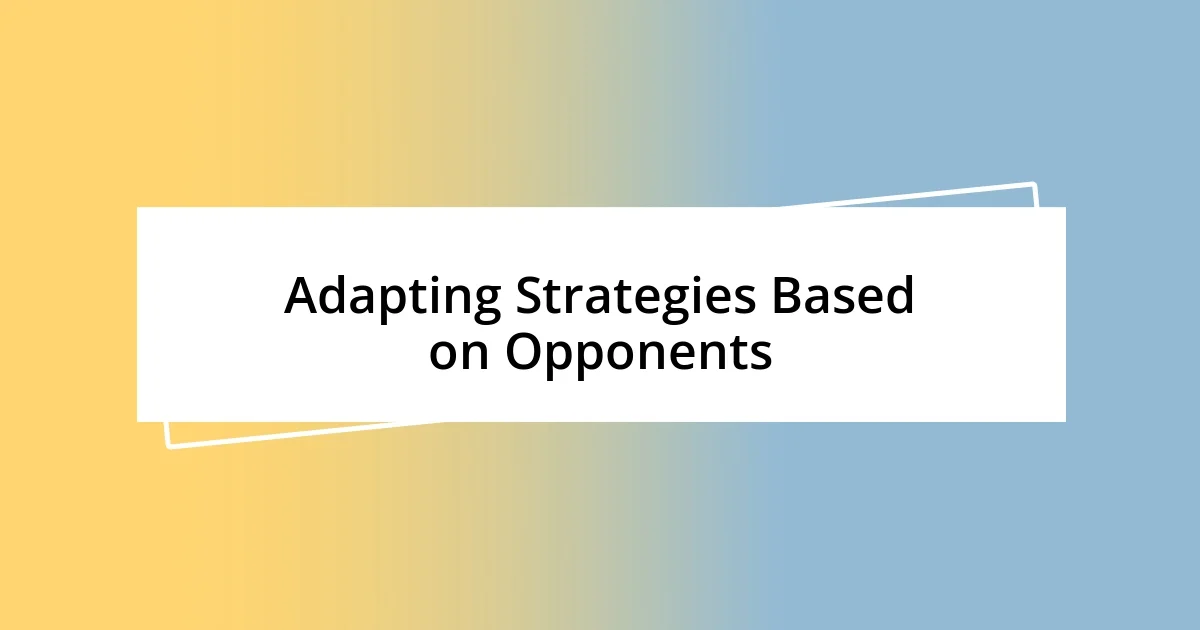
Adapting Strategies Based on Opponents
It’s fascinating how the dynamics of Splendor can shift based on your opponents’ moves. I vividly remember a game where I realized that focusing solely on my strategy was a mistake. My opponent was methodically building toward a hefty noble, and my oversight made me feel like a deer in headlights. I quickly adapted, shifting my strategy to directly counter their moves. Instead of solely collecting gems for my plan, I started hoarding those that my opponent needed. This change not only thwarted their noble pursuit but also set me up for success, reminding me how vital it is to read the board.
In another memorable game, I found myself in a tight race for a limited card that both I and my opponent coveted. Feeling the tension rising, I knew I had to pivot on a dime. Instead of aggressively competing for that card, I decided to divert my attention to a different gem combination that was gaining traction in my hand. That unexpected turn not only caught my rival off guard but also allowed me to secure a different valuable card that ultimately shaped my victory. It’s moments like these that emphasize the importance of staying flexible—are you really attuned to what’s happening around you?
Ultimately, I’ve come to see Splendor as much about social dynamics as it is about gems and cards. After a tense match, I reflected on how emotional investments in games can lead to rash decisions. I’ve learned to keep my composure, but sometimes it’s just so tempting to make a move out of frustration! I’ve often asked myself, “Am I reacting out of fear, or am I strategizing based on observation?” Learning to distinguish between the two has become a game-changer. It’s not just about the victory; it’s about how I choose to engage with my opponents and adapt to their styles along the way.
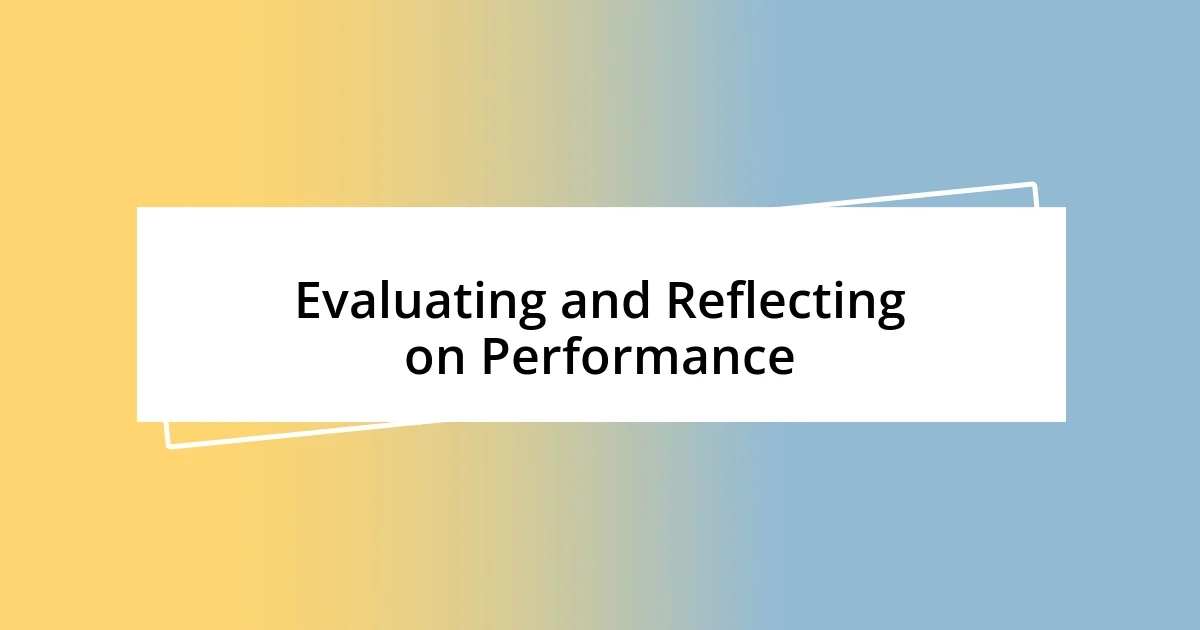
Evaluating and Reflecting on Performance
Reflecting on my performance after each game of Splendor has become a critical part of my growth as a player. I often sit back, replaying the match in my mind, and ask myself what decisions truly influenced the outcome. For example, I recall one specific game where I overcommitted to a particular strategy and completely neglected to adapt to the changing dynamics on the board. That moment taught me that being rigid can lead to missed opportunities and ultimately, defeat.
I also find it enlightening to analyze the moves I made compared to those of my opponents. There was a match where I noticed how one player seemed to masterfully time their purchases for maximum impact. It made me realize that sometimes, my actions can appear hasty, driven by excitement rather than strategy. This introspection has led me to develop a checklist in my mind: Am I using my resources efficiently? Am I observing what works and what doesn’t? This practice of evaluating after each session has turned losses into valuable lessons.
Furthermore, tapping into the emotional side of gaming can change how I approach reflection. After a particularly close match, I remember feeling a mix of frustration and triumph. I took a moment to breathe and think—what did that rollercoaster of emotions reveal about my strategies? In those heated moments, I’ve learned to embrace my feelings, using them as a compass to guide future gameplay. The real question I now face is—how can I channel that energy positively, both in victory and defeat? Each game, for me, is not just a contest but an opportunity for personal improvement.


